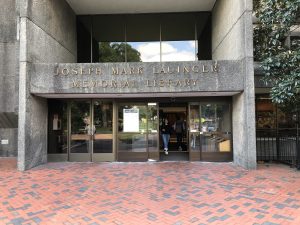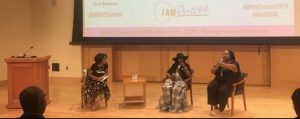The institutional memory of a university is short. Every four years, the undergraduate population turns over entirely, and with it, parts of its past are forgotten. For students arriving on campus for the first time, this letter serves as an introduction to our recent campus history and the role we can play in shaping its future.
When you step onto Georgetown’s campus, there is a gulf between the privileged university experience and the stark realities facing Washington, D.C. The “Georgetown bubble” separates students from the rest of the city. While parents bringing their children to school in the Mount Pleasant neighborhood face federal agents threatening arrest, those on M Street carry name-brand shopping bags. The detachment of our campus allows us to ignore the political situation, culture, and history of the city we are a part of. As a predominantly wealthy and white university, our separation can breed ignorance and apathy. Comfort in our bubble is especially dangerous as President Donald Trump’s regime accelerates the disparities in law enforcement and arrests between our neighborhood and the rest of D.C.
Privilege has shaped Georgetown University since its founding. The school began as an institution exclusively for white men and was further financed by the sale of at least 314 enslaved people in 1838. Despite a student referendum demanding reparations, the Reconciliation Fund, and a new required class on Georgetown’s history, the university has had limited atonement for its past. Our exclusionary history continues today, with a quarter of the freshman class being legacy students, and around three-quarters of the student body coming from families in the top 20% of America’s wealth bracket. Given Georgetown’s prestige across fields such as law, business, and academia, its graduates are likely to continue to hold significant influence, making current students a key part of the future American elite. As a part of this university, you have tangible power to either perpetuate or resist the inequities of our society.
Here on campus, we must continue to build on the history of student resistance. Despite the work of students across decades, the university has repeatedly dismissed our needs and demands. This spring, a referendum calling on Georgetown to divest from companies providing weapons technology to Israel and end partnerships with Israeli institutions passed with two-thirds support from the student body voters. The Georgetown administration rejected the referendum 30 minutes after the result was released.
As Israel continues to commit genocide against Palestinians while annexing the West Bank and the Gaza Strip, the apathy of this university is disturbing. Especially given that many Georgetown students aspire to work for the U.S. Departments of State or “War,” we implore all in Georgetown’s community to contemplate the employment they pursue and the ways they may be complicit.
Our activism—whether through protest or service—must also not be isolated on our campus; it should be part of a larger movement within Washington, D.C.’s social fabric. In the predominantly Black neighborhoods of Wards 6, 7, and 8, bordering the Anacostia River, advocacy is crucially important for residents. As communities face food apartheid, groups like D.C. Greens are working to create sustainable food systems in these communities. Meanwhile, organizations like the Washington Interfaith Network lead campaigns related to economic and climate justice.
With Trump’s deployment of the National Guard and takeover of the D.C. police force, it is even more necessary that we support our neighbors throughout the city. If you see immigration enforcement, report it to the Migrant Solidarity Mutual Aid Hotline and always record interactions with officers to provide an objective record of events, as is your right to do. We are proud to see students mobilizing on campus to oppose the federal occupation of the city through groups like Free DC, which organized a D.C. area walkout of students this past Tuesday. We hope this activism continues and grows in the coming weeks through the work of on-campus groups including, but not limited to, Georgetown Students for Justice in Palestine, Georgetown Coalition for Workers’ Rights, and Georgetown ACLU.
If you decide to mobilize, it is important to be aware of potential risks and prepare accordingly. Even before Trump’s presidency, organizing in D.C. and across the United States was a dangerous task. In the spring of 2024, police brutalized college students across the country for peacefully protesting Israel’s genocide in Gaza. In D.C., vigils, walkouts, and protests culminated in a two-week-long encampment at George Washington University. Ultimately, the encampment ended when nearly 150 Metropolitan Police Department officers cleared it by force, arresting 33 people, including seven Georgetown students. These tactics used against student protesters are proof of the state’s willingness to enact violence upon dissenting speech, and we must prepare for such uses of force in the future. All students should know their rights when protesting or interacting with law enforcement, and attend all events alongside people they trust.
It is not enough to simply be aware of these injustices unfolding around us; we know our engagement has power and we, as Georgetown students, must act accordingly. The nature of our campus and city demands strategic commitment, and the future you wish to see will not be built on apathy, but by action.
The editorial board is the official opinion of The Georgetown Voice. The editorial board operates independently of the Voice’s newsroom and the General Board. The board’s editorials reflect the majority opinion of the board’s members, who are listed on the masthead. The editorial board strives to provide an independent view on issues pertinent to Georgetown University and the broader D.C. community, based on a set of progressive institutional values including anti-racism, trauma-informed reporting, and empathetic and considerate journalism.







